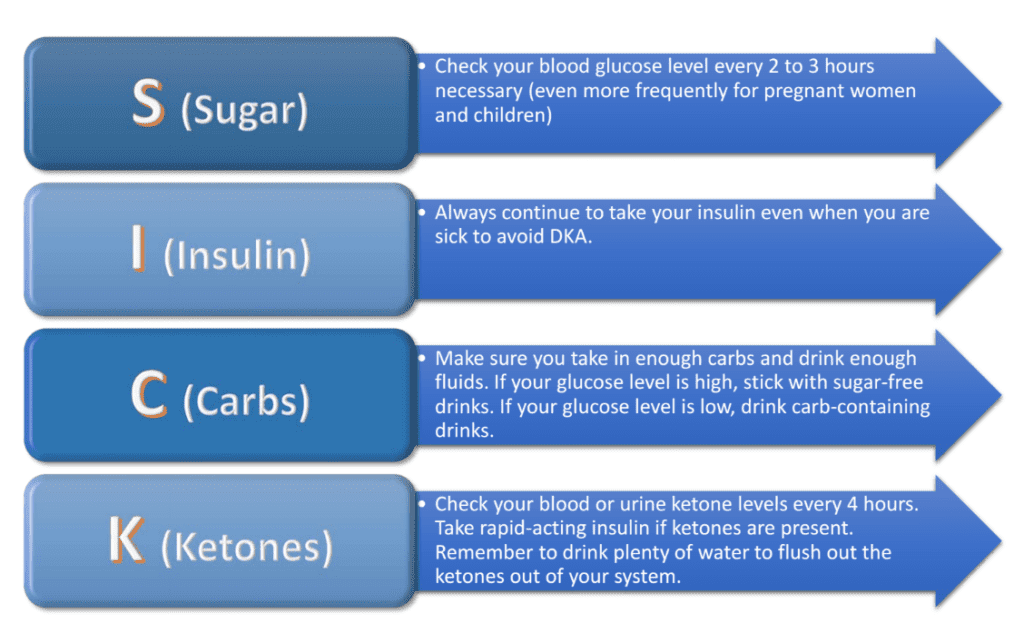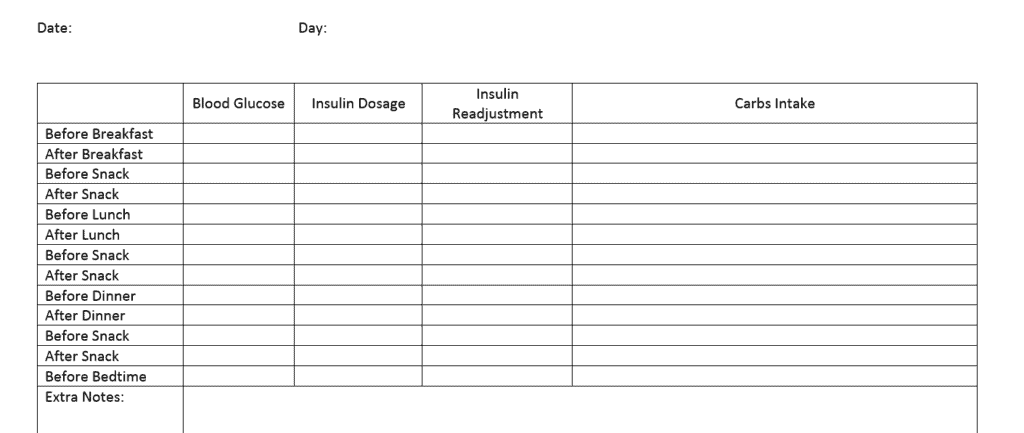
When people come down with minor illnesses such as flu, cold, urinary tract infection, or intestinal problems, they usually lose their appetites and have very low energy levels. Most would want to stay in bed, take some over-the-counter medication, sleep, and let the medication and their immune systems do their jobs to kick the illness to the curb.
However, for individuals with diabetes, a common sickness or infection is not as easy to fight off. Without careful care management, the fluctuation of glucose and ketone levels can trigger severe complications. If left unattended, these complications can become life-threatening medical emergency cases such as diabetic coma. To avoid such daunting situations, the best way to cope with a minor illness is to learn, plan, and prepare ahead of time.
So when you do become sick, you will know exactly what to expect and what protocols to follow under different scenarios. At the same time, you will already have all the supplies at home. This way, you will feel safe and secure, and you can concentrate on getting better. In order to help you prepare for a sick day management plan and kit, this article will cover these topics:
[accordions id="992"]
Contents
What Happens to Your Body and Your Blood Glucose When You Are Sick?
Depending on general health, age, and hormonal differences, each person reacts slightly different to illness. But generally, when you are sick, you are under stress. To counteract, your body releases stress hormones such as adrenaline and cortisone into the bloodstream to activate glucose production in the liver. This reaction leads to a rise of blood glucose levels above normal level and desensitization of the blood glucose-lowering effects of insulin.
Under these circumstances, even the most stable diabetes becomes much harder to control within the target range. Also, vomiting and diarrhea can reduce nutrient absorption and affect your blood glucose levels. For type 1 diabetes individuals, if your body does not have enough carbohydrates, it will start burning fat for energy and produces ketones in the process. As a result, your ketones levels will escalate.
If the condition persists, the above-normal levels of ketones may lead to ketoacidosis or even diabetic coma. For people with type 2 diabetes, especially seniors, you can develop a similar condition called hyperosmolar hyperglycemic nonketotic coma. Both of these conditions are extremely dangerous and can be fatal. The good news is that you can learn to manage your blood glucose and ketones levels at home by following appropriate advice and protocols. By knowing exactly what to do in these circumstances, you will feel less stressful since you are not facing the complications in the dark. It will also give you an idea of how to manage your illness by yourself and when to call for help.
For further reading I suggest these articles:
Prevention Is the Key
Although planning the sick day management is essential for individuals with diabetes, many people forget that prevention is equally important. Here are several tips that may help you avoid getting sick:
- Keep up with your flu shots.
- Wash your hands properly and often when you come home from public places. Always wash your hands before you eat. Bring wet napkins or hand sanitizer gels in your bag in case there is no place for you to wash your hands.
- Stay six feet away from a coughing or sick person.
- Avoid badly ventilated public areas during flu seasons. Bring a surgical mask in case you have no way of avoiding these places.
- When you sense that your immune system is down, take extra vitamins, eat more fruits, and drink more water for several days. The boost in vitamins and fluids will kick your immune system back to normal.
- Clean your home often to get rid of germs that may make you sick.
- If you feel that your throat is acting up, gargle with salt water in the morning and evening after you brush your teeth. The salt will help kill off the germs and decrease the chance of infection.
- Always stash an extra layer of clothing in your bag or your car when you go out
- Exercise often and eat healthy foods will give you a general boost the immune system and in your overall health.
Planning Ahead
Don’t wait till you are sick before you ask this question. Work with your doctor, or diabetes educator to prepare a plan for sick days in advance. In your plan, you should have these things:
- A plan of medication adjustment when your blood glucose drops too low.
- A plan of medication adjustment when your blood glucose gets too high.
- How often you should measure your blood glucose and urine ketones.
- What medications to take and what medications to stop when you are sick.
- What food you should eat when you are sick.
- When you should call your doctor, educator, dietitian, or emergency on-call doctor. And make sure you know how to reach your doctor, educator, and dietitian at night, on weekends and holidays.
- A log-book or app program to keep all your data as well as all the emergency information, emergency contact numbers, and your insurance information.
- An emergency supplies kit
General Sick Day Advice
- Whether you have type 1 or type 2 diabetes, the Number 1 rule of thumb is to continue taking your insulin medication. Most people require an increase in medication either by oral blood glucose lowering medications or insulin (please refer to “How to Calculate Your Dosage Adjustment” for more information about dosage readjustment and “Advice for Taking Care of Children with Diabetes” for information for children).
- Blood glucose and ketone levels should be checked every 2 to 3 hours to readjust your medication plan. Set a timer to remind yourself. Remember to double check if your ketone testing strips have expired as they are only good for 6 months after the bottle has been opened.
- You should drink plenty of fluids to maintain hydrated. It will help flush the ketones from your system and lower your body temperature.
- You should try to keep your carbohydrate intake as normal as possible even when you are sick. Your body needs sugar for making energy and balancing your insulin level. Even when your appetite is low, try to eat food that contains carbohydrate such as dry biscuits, toast, and boiled rice. If you have no appetite at all or the illness is preventing you from swallowing properly, you can replace your meals with drinks.If your blood glucose levels are below 15 mmol/l, your drinks should contain glucose; if your blood glucose levels are above 15 mmol/l, they should be unsweetened. There are various reminder apps to help you maintain a regular eating/drinking schedule.
- Getting plenty of rest is critical. Stop all vigorous exercise routines that will stress out your body even more and be kind to your body.
- Always alert at least two friends or family members of your illness in case you need assistance or emergency care later. Note that your doctor will want to hear from you under these circumstances:
- When you have been sick or have had a fever for 2 to 3 days and are not getting any better
- When you have vomited or diarrhea for more than six hours
- When your blood glucose is consistently higher than 250 mg/dl despite having taken extra insulin
- When you have taken only oral medication and your blood glucose level has stayed above 250 mg/dl for more than 24 hours
- When you have any symptoms of DKA
- When you are unsure about your symptoms or fluctuations of ketone and blood glucose levels
- Keep logging all your information in a notebook for several reasons. When you are sick, you cannot remember as well about what you ate and when was the last time you took your medicine. By logging all your information down, you can easily refer to your previous activities and judge whether you are getting better or worse. You will need all these information if you need to consult your doctor or diabetes educator.Should you need emergency care, you will probably be too sick to answer all the questions properly. By handing over the notebook, your emergency care doctors and nurses can quickly figure out what to do to treat the complications.
Keep Your Logbook Handy
If there is no way you can remember all the information when you are well, you can be sure that you will not be able to remember anything at all when you are sick. Instead of looking for all the information you need when you are sick, compile a list of information in your logbook binder.
Information you need to log in your notebook:
- The insulin adjustment guidelines from this article and your doctor’s fine-tuning tips
- The food intake guidelines from this article
- Phone number of your doctor, diabetes educator, dietician, and the hospital emergency care hotline
- Phone number of your emergency contact friends and family members
- All your emergency information including all your existing medical conditions, allergies, and medicine treatments (If you have certain information charted on your smartphone, remember to write down your phone password and the apps you are using for tracking various vital records)
- Your diabetes information: your usual glucose level and insulin dosage treatments
- Your blood glucose level readings on your sick days
- You results of ketone tests on your sick days
- Your insulin adjustment dosages and administration schedule
- Your fluid intake and schedule
- Any symptoms such as vomiting, diarrhea, stomach cramps, or headaches
- Your body temperature
- Your food intake (especially items with sugar in it)
- Your weight fluctuation
- Your pulse rate
Logbook Formats
Although it is a daunting task to write down everything when you feel crummy, you must keep a log to manage your diabetes properly while you are sick. However, if you write down all your information without a template guide, you are very likely to end up with a sheet of jumbled facts. To help organize your input information, here are 2 different templates you can follow. These 2 guides are catered to individuals with different stages treatment needs:
- The first one is designed for individuals who have very little change in their blood glucose and ketone levels. It is a simple chart for keeping track of your blood glucose level, your medication dosage, your insulin readjustment, and your carb intake throughout your day. Click here to download simple logbook
- The second template is designed for individuals who have type 1 diabetes and require intensive management of their sick day progress. It includes an hour-to-hour monitor of your weight, your blood glucose and ketone levels, your medication dosage and readjustment units, your food intake diary, and your fluid consumption record. This chart is also very useful for infants and younger children as their health conditions can fluctuate much drastically within shorter time interval.
TheDiabetesCouncil Article | Reviewed by Dr. Sergii Vasyliuk MD on June 10, 2020






